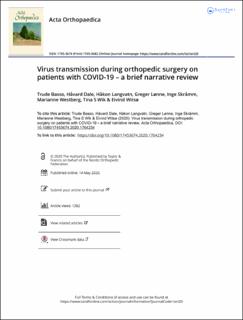Virus transmission during orthopedic surgery on patients with COVID-19 – a brief narrative review
Basso, Trude; Dale, Håvard; Langvatn, Håkon; Lønne, Greger; Skråmm, Inge; Westberg, Marianne; Wik, Tina Strømdal; Witsø, Eivind
Journal article, Peer reviewed
Published version

Åpne
Permanent lenke
https://hdl.handle.net/11250/2730897Utgivelsesdato
2020Metadata
Vis full innførselSamlinger
- Department of Clinical Medicine [2065]
- Registrations from Cristin [9766]
Sammendrag
Background and purpose — COVID-19 is among the most impactful pandemics that the society has experienced. Orthopedic surgery involves procedures generating droplets and aerosols and there is concern amongst surgeons that otherwise rational precautionary principles are being set aside due to lack of scientific evidence and a shortage of personal protective equipment (PPE). This narrative review attempts to translate relevant knowledge into practical recommendations for healthcare workers involved in orthopedic surgery on patients with known or suspected COVID-19. Patients and methods — We unsystematically searched in PubMed, reference lists, and the WHO’s web page for relevant publications concerning problems associated with the PPE used in perioperative practice when a patient is COVID-19 positive or suspected to be. A specific search for literature regarding COVID-19 was extended to include publications from the SARS epidemic in 2002/3. Results — Transmission of infectious viruses from patient to surgeon during surgery is possible, but does not appear to be a considerable problem in clinical practice. Seal-leakage is a problem with surgical masks. Due to the lack of studies and reports, the possibility of transmission of SARS-CoV-2 from patient to surgeon during droplet- and aerosol-generating procedures is unknown. Interpretation — Surgical masks should be used only in combination with a widely covering visor and when a respirator (N95, FFP2, P3) is not made available. Furthermore, basic measures to reduce shedding of droplets and aerosols during surgery and correct and consistent use of personal protective equipment is important.
